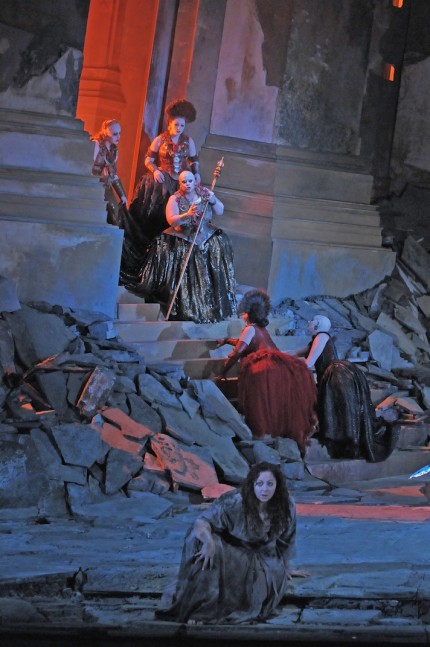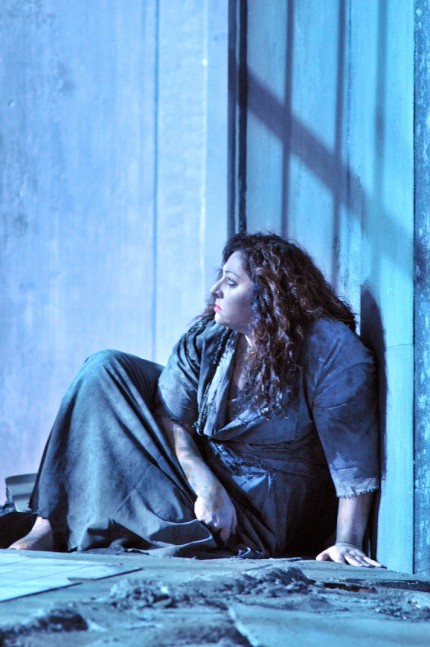With intermittent voltage, “Elektra” ignites belated sparks at Lyric Opera
One could hardly come up with a less appropriate season-opening vehicle for an opera company than Elektra. Amid the prefatory liver pate, festive post-performance dinner and gala, and tuxedoed older men and bejeweled, extravagantly gowned younger women Saturday night at the Civic Opera House, Richard Strauss’s bleak, brooding tragedy of family secrets, adultery, bitter hatred, revenge and murder seems somewhat alien. (Or does it?)
The Lyric Opera of Chicago elected to kick off its 58th season with Elektra, the company’s first mounting of Strauss’s 1909 operatic riff on Sophocles’ Greek tragedy in two decades. And while the production offered eye-popping visuals and worthy dramatic moments late in the evening, Saturday’s opening performance proved something of a disappointment with vocalism that was mostly accomplished but rarely edge-of-seat thrilling in a way that Strauss’s remarkable music demands.
Composed over a century ago, Strauss’s roiling, harmonically twisted score can still knock one sideways. The restless, eruptive music depicts the lurid tale of the half-crazed Elektra, whose father Agamemnon was killed by her mother Klytamnestra and her lover Aegisth, and whose murders Elektra, in turn, plots with great relish in revenge.
The production certainly succeeded visually, at least in terms of the design. John MacFarlane’s unit set is a stunner, a towering dilapidated stone wall and staircase strewn with rubble, evocatively lit by Jennifer Tipton. The precariously titled facade and red, hellish smoke inside is like a throwback to Hammer horror films, reflecting the disordered minds and evil within. When Elektra’s revenge is achieved, blood flows freely down the steps, which Elektra greedily bathes herself in before her fatal dance of death.
Less successful were MacFarlane’s costumes. Elektra’s gray not-so-glad rags were suitably unprepossessing but some of the rest of the getups verged on camp with the bald skull caps and garish Joker-like makeup for Klytamnestra and her retinue.
Much anticipation centered on Christine Goerke, here making her Lyric Opera debut in the preposterously demanding title role—a part that calls for vast volume as well as tonal sensitivity and nuance to covey the searing emotional pain, and unmoored psyche of the young girl driven to the edge of madness by her father’s murder.
The American soprano was an admirable, often inspiring Elektra. A substantial woman, Goerke literally threw herself into the role. Goerke moved well on stage and did all that was asked of her dramatically, conveying the conflicting rage, despair and unhinged joy of her ultimate triumph (though director Sir David McVicar’s idea of having Elektra repeatedly hit herself on the side of the head in time to Strauss’s slashing chords just looked silly and bizarre).
Vocally, Goerke did not deliver the tour de force performance opening night that was advertised and anticipated by many. She seemed to be husbanding her resources for the big set pieces in the latter half of the 105-minute intermission-less evening. Her extended opening scene was solidly sung but generalized in expression and hung fire, lacking thrust and dramatic intensity, phrases curtailed rather than soaring out into the house.
The “Recognition scene” when Elektra realizes the stranger who brings news of her brother’s death is actually Orest himself went better. Here Goerke finally cut loose with some gleaming top notes, big tone and emotional abandon, and from there to the end of the opera, Goerke showed flashes of vocal brilliance. This is only her second time singing this role and perhaps at some point Goerke will be a world-class Elektra but she’s not there yet.
Emily Magee as Elektra’s sister Chrysothemis seemed similarly under-energized in the first half of the evening with her voice failing to project evenly, almost sounding miscast in the role. Magee rose to the big moments near the end and actually sang more powerfully than Goerke in the sisters’ closing duet and final scene.
The most consistent vocalism of the evening was provided by Jill Grove. Despite being handicapped by the Night of the Living Dead costuming and makeup, the American mezzo was fearless as Klytamnestra. Grove brought a rounded characterization to what is usually portrayed as a stock opera villainess, and sang with a power, vibrancy and emotional connection to the text that was too often lacking elsewhere.
In the two small male roles, Alan Held was a fine Orest, bringing a sonorous bass and dignity to his belated appearance. Dignity was less achievable in McVicar’s over-the-top conceit of having the dissolute Aegisth as a rouged-over drag queen, though tenor Roger Honeywell sang well in his brief assignment.
Sir Andrew Davis displayed his Straussian street cred once again, clarifying Strauss’s huge forces and textures and drawing magnificent playing from the Lyric Opera Orchestra.
Still, unusually for Lyric’s season opener, much of the evening felt like a work in progress that still needed rehearsal time or explication (who was the guy lying in the corner of the stage?). Overall there was a want of, well, electricity, that made one feel like we were only getting part of the full sonic impact and emotional intensity, vocally and otherwise, of this extraordinary music.
Elektra runs through October 30. lyricopera.org; 312-332-2244.

Posted in Performances





